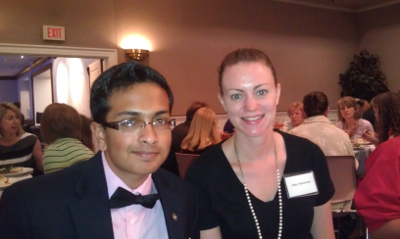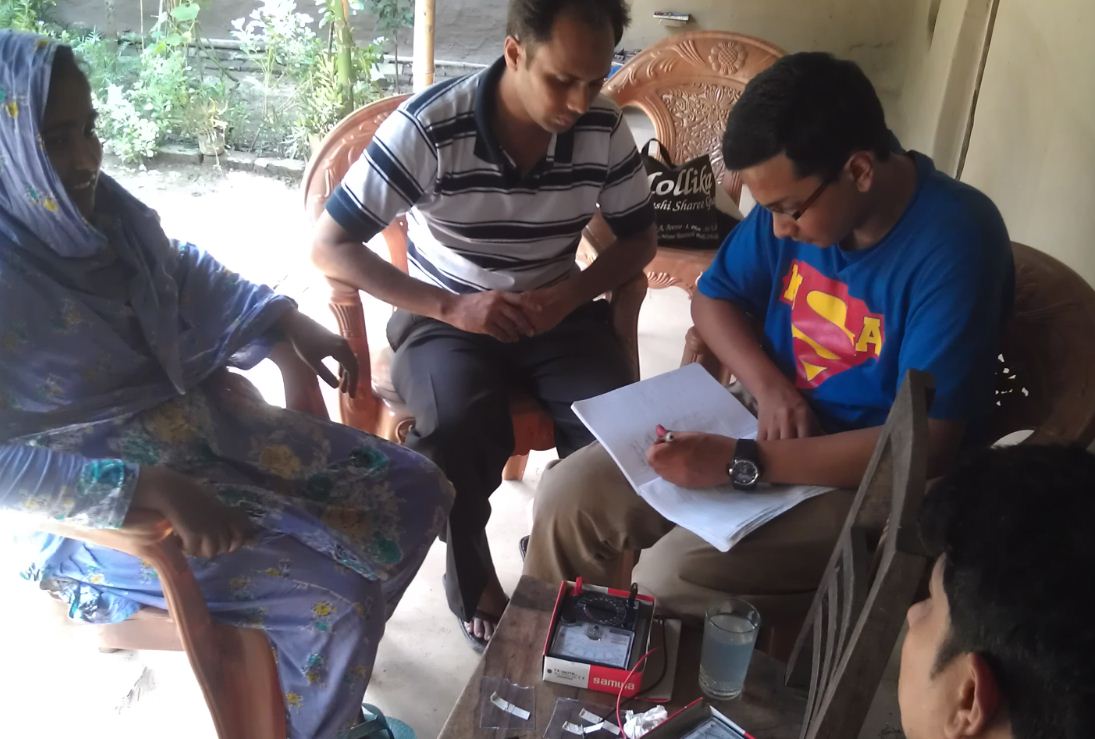NMSI Student Thabit Pulak Earns National Honors for Research in STEM
Timothy Huneycutt |
March 13, 2014
Last year, we announced that our College Readiness program (formerly known as NMSI’s Comprehensive AP program) was expanding to four schools in Richardson ISD in Texas, thanks to a grant from the Texas Instruments Foundation. This year, those four schools have implemented our program, and Thabit Pulak, of the many incredible students in the program, was recognized for his amazing achievements in the world of STEM.
Pulak is a student at Richardson High School and was one of forty finalists in the national Intel Science Talent Search. His entry in the competition was an arsenic water filter and test which he has been developing since 2010. To describe the impact Pulak and NMSI are having on Richardson High School, we reached out to Pulak’s AP chemistry teacher, Amy Hammer, and we contacted Pulak himself to discuss his experience over the last few weeks.
When Pulak first entered Hammer’s classroom, he didn’t stand out to her as an overly talkative student until the class started discussing their science fair projects. “Thabit's concept and idea right off the bat struck me as very unique,” she says, “and it was very well thought out. He found a real problem in the world that he was trying to solve. It wasn't theoretical or anything like that; it was a very concrete example.”
Pulak’s example, the arsenic water filter, was a project he started after visiting his parents’ home country of Bangladesh, where he witnessed first-hand the effects of arsenic poisoning. Compelled to do something to help the people there, he began working on the filter as a personal project and only entered it into the science fair when he realized he needed to submit a project. “Surprisingly enough, it just advanced to the international fair,” he says, and that’s when he saw other students really begin to take notice of the science fair, and realize that science research is not just an assignment or a one-time thing. “It’s something you can do and pursue and explore.”
This ripple effect of interest among the students is something Hammer has witnessed as well, especially within her own classroom. She says that her students have been motivated to do better in class by seeing the results of Pulak’s work and the success and recognition he’s achieved. Nothing like this has ever been on their radar before, but now they see that there’s a whole world of opportunity that they can pursue. “I think his project and his success have brought awareness to a different kind of student,” she says, “and a different type of competition; that anybody can put their mind to learning how to do something like this.” But before a student can make a scientific breakthrough like Pulak’s, they first need the right instruction and support to develop deep content knowledge in those critical subjects of math and science – and that’s where NMSI comes in.
 Richardson High School began NMSI’s program this school year and Hammer has had nothing but praise – especially for the professional development and student resources. “The teacher training was just wonderful,” she says. “We really had no idea of the materials that were available to us online, and that was just eye-opening.” The teachers also had the opportunity to attend one of NMSI’s Saturday study sessions, which had a huge turnout of students because Hammer and her fellow teachers set up the expectation that every AP student needs to be there. “It was a very productive day,” she says, and everyone is looking forward to the next one, as well as the mock-AP exam. “In the past, right before the AP exams, people are so busy, and the kids are going on field trips, and it's hard to find three hour blocks to take the exams, so I think the kids are really excited about the opportunity to sit down and take a real, serious practice AP exam. I think it’s going to be a great change in our program."
Richardson High School began NMSI’s program this school year and Hammer has had nothing but praise – especially for the professional development and student resources. “The teacher training was just wonderful,” she says. “We really had no idea of the materials that were available to us online, and that was just eye-opening.” The teachers also had the opportunity to attend one of NMSI’s Saturday study sessions, which had a huge turnout of students because Hammer and her fellow teachers set up the expectation that every AP student needs to be there. “It was a very productive day,” she says, and everyone is looking forward to the next one, as well as the mock-AP exam. “In the past, right before the AP exams, people are so busy, and the kids are going on field trips, and it's hard to find three hour blocks to take the exams, so I think the kids are really excited about the opportunity to sit down and take a real, serious practice AP exam. I think it’s going to be a great change in our program."
Pulak also believes the Saturday study sessions are beneficial for students because it’s a much more focused approach to learning and instruction. “It’s also really relaxed too. There’s no pressure coming from left to right because it’s Saturday and then the next day is Sunday, so it’s really… you’re coming there because you want to and the teacher wants to, and it works out in the end very well.”
Though he’s only enrolled in AP Environmental Science this year, Pulak has taken several AP classes over the course of his high school career. In fact, he took all of the AP math and science courses that he could last year – AP Biology, AP Chemistry, AP Physics, and AP Calculus AB/BC – and he passed the AP exams for all, save for Calculus BC, which he blames on his busy science fair schedule. But regardless of exam scores, the rigorous courses are preparing him for college-level work, and the reason he took so many AP courses at once is because he felt that learning as much about science as possible could help him in real life – and it did. “My project, the arsenic water filter, is [designed] ultimately to help a health issue, which is, when you drink arsenic water you usually get cancer and other bodily ailments; so AP biology definitely had that connection to it.”

On a more general level, Pulak believes that taking a variety of AP math and science courses is helpful because the students will learn more about the subjects. If students are thinking about pursuing a degree or career in STEM, Pulak offers the following advice:
“One of the coolest things about this field is that much of the stuff that you’re doing here has a direct impact on some aspect of people’s lives. So, if you go into a certain STEM field, try to have a sort of goal in your head, some idea in your head of the kind of things people are facing and what you might want to work towards making an impact in. Some people may not know what they want to do in STEM, and that is fine, but try to have a goal on looking at the community around you, seeing what the problems there are, and try to do your share in helping make the society a better place using STEM.”
NMSI is proud to support Thabit Pulak, Amy Hammer, and the rest of the students and teachers at Richardson High School, and we will continue to offer the same levels of support and encouragement to all of our schools across this country through our College Readiness and teacher training programs. Our nation may still be facing a STEM education crisis, but it is students like Pulak and teachers like Hammer who will help bring America back to the forefront of STEM innovation and success.
Help Improve STEM Education – Support Your School Today!